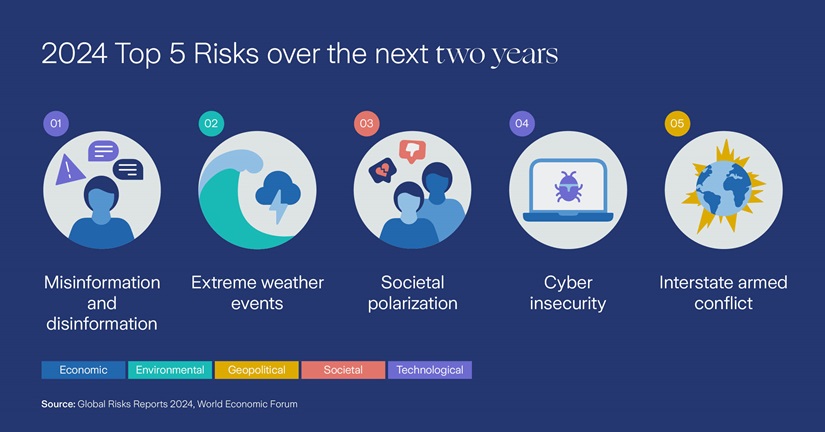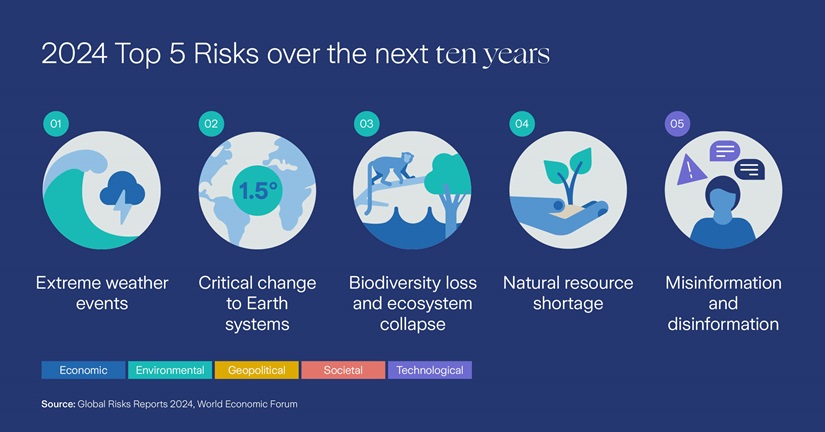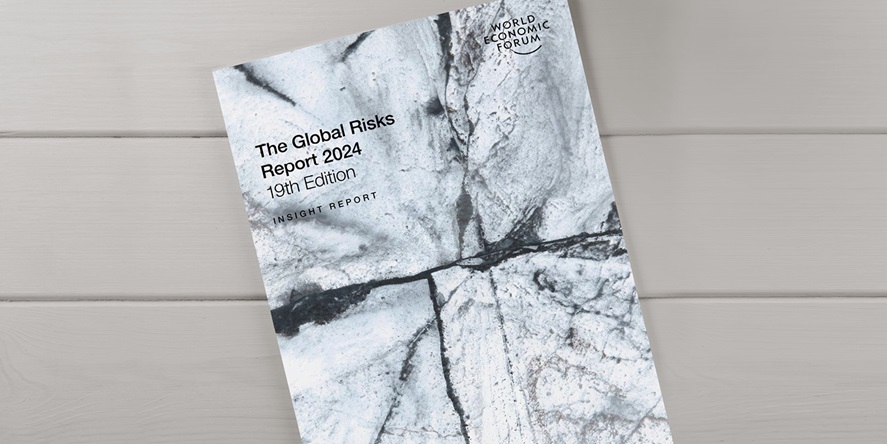Global Risks 2024: Disinformation & environmental threats
Climate and EnergyEconomy and WorldTechnology and AIArticleJanuary 10, 2024
The World Economic Forum’s 19th annual report highlights the challenges of addressing immediate and long-term risk.
“Misinformation and disinformation” were ranked as the risks most likely to have an impact on the world in the next two years, according to the World Economic Forum's Global Risks Report 2024.
“Extreme weather events” was the number two risk over a two-year time frame and topped the list of risks over a 10-year period.
The report, which was released today, is produced in partnership with Zurich Insurance Group and Marsh McLennan. It draws on the views of more than 1,400 global risks experts, policymakers and industry leaders surveyed in September 2023.

Results highlight a predominantly negative outlook for the world in the short term that is expected to worsen over the long term. While 30% of global experts expect an elevated chance of global catastrophes in the next two years, nearly two thirds expect this in the next 10 years.
Concerns over a persistent cost-of-living crisis and the intertwined risks of AI-driven misinformation/disinformation and societal polarization dominated the risks outlook for 2024. According to the report, the connection between falsified information and societal unrest will play a key role amid elections in several major economies that are set to take place in the next two years. “Interstate armed conflict” is a top five concern over the next two years.
The report predicts that the coming years will be marked by persistent economic uncertainty and growing economic and technological divides. “Lack of economic opportunity” is ranked sixth in the next two years.
Extreme weather and the environment
Environmental risks continue to dominate the risks landscape over all timeframes. Two-thirds of global experts are worried about extreme weather events in 2024. “Extreme weather,” “critical change to Earth systems,” “biodiversity loss and ecosystem collapse,” “natural resource shortages” and “pollution” represent five of the top 10 most severe risks perceived to be faced over the next decade. However, expert respondents disagreed on the urgency of risks posed. Private sector respondents believe that most environmental risks will materialize over a longer timeframe, whereas civil society or government point to the growing risk of getting past a point of no return.

The report recommends focusing global cooperation on rapidly building guardrails for the most disruptive emerging risks, such as agreements addressing the integration of AI (artificial intelligence) in conflict decisions. However, the report also explores other types of action that need not be exclusively dependent on cross-border cooperation, such as shoring up individual and state resilience through digital literacy campaigns on misinformation and disinformation, or fostering greater research and development on climate modelling and technologies with the potential to speed up the energy transition, with both public and private sectors playing a role.
“The world is undergoing significant structural transformations with AI, climate change, geopolitical shifts and demographic transitions,” said John Scott, Head of Sustainability Risk, Zurich Insurance Group. “Known risks are intensifying and new risks are emerging – yet they also provide opportunities. Collective and coordinated cross-border actions play their part, but localized strategies are critical for reducing the impact of global risks. The individual actions of citizens, companies and countries can move the needle on global risk reduction, contributing to a brighter, safer world.”
Download The Global Risks Report
The Global Risks Report 2024 (12.58 MB/PDF)
The Global Risks Report 2024 - Executive Summary (2.12 MB/PDF)
